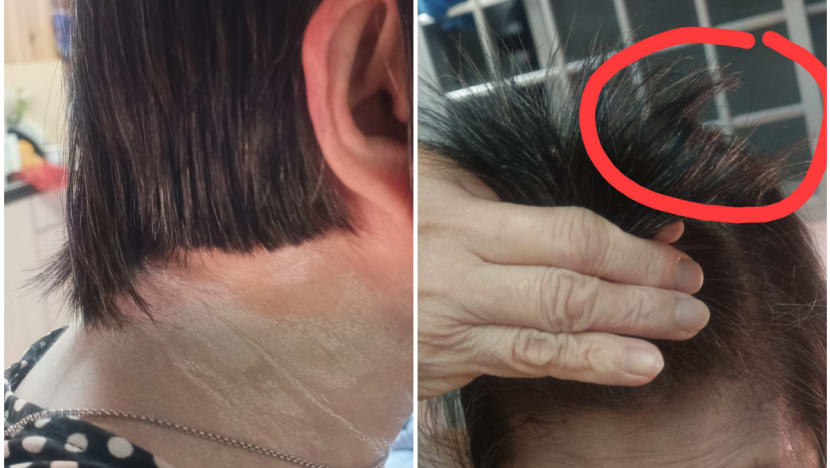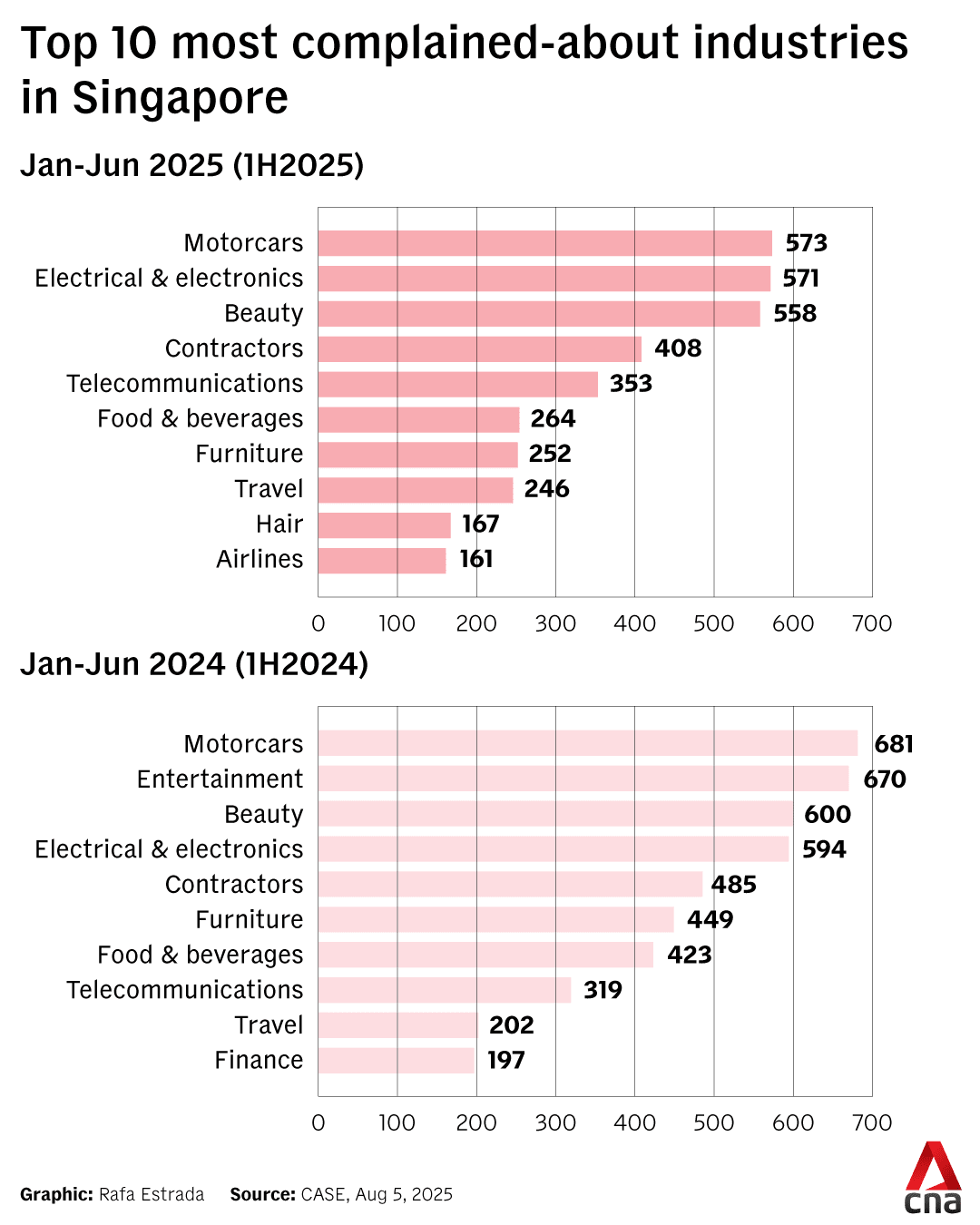Trade group calls for hair salons to be regulated after complaints enter consumer watchdog's top 10
The Hair and Cosmetology Association of Singapore is calling for oversight as complaints about aggressive sales tactics and poor service at hair salons remain a concern.

Mr Yeo Z G's mother received an uneven haircut during a visit to a hair salon. (Photos: Mr Yeo Z G)

This audio is generated by an AI tool.
SINGAPORE: A trade association has called for the regulation of the hair industry after hair salons entered the Consumers Association of Singapore’s (CASE) top-10 list of most complained-about sectors for the first half of this year.
The Hair and Cosmetology Association of Singapore (HACOS), which represents more than 300 members in the beauty, hair, makeup and nails industries, said stronger oversight and minimum competency standards are needed to raise professionalism and protect consumers.
Complaints against hair salons rose to ninth-highest among industries between January and June this year, surpassing even airlines, which placed 10th, according to CASE figures released on Aug 5. The motorcar industry received the most complaints.
This marks a return for hair salons, which were absent from the top 10 in the same period last year.
However, the number of complaints in the first half of this year was 167, lower than the 170 in the first half of 2024, said CASE president Melvin Yong.
Prepayment losses were also lower - S$5,619 (US$4,386) this year compared with S$21,810 last year.
Mr Yong said the complaints were largely about high-pressure sales tactics, misleading or false claims, hidden charges for add-ons and poor service.

Allegations of poor service and aggressive upselling have plagued the hair industry, with some customers being charged excessive prices for services they did not agree to.
In June, the HairFun chain of salons admitted to unfair trade practices targeting elderly clients. Salons had offered free or cheap haircuts, then misled seniors into buying expensive services and packages.
In one case, an elderly man who went in for an S$8 haircut was charged nearly S$1,000 for a treatment package he had not consented to. HairFun has since pledged to end such practices, cooperate with CASE to resolve complaints and provide a five-day cooling-off period for refunds on prepaid packages.
CUSTOMERS SHARE BAD EXPERIENCES
Some consumers have taken to social media to share their experiences with hair salons.
Mr Bernard Wang, 33, a travel influencer on YouTube, posted a short video describing a decline in service standard at a salon after he bought a 12-session package for about S$250.
During his first visit, where he had a haircut and a wash for S$25, "service was perfect".
"They served tea, gave head and shoulders massage despite running on full house on weekends," said Mr Wang, who also does trading and web design.
But from his third visit, the staff started taking him into a room for "free scalp scanning" to show him that his scalp was inflamed or peeling and tried to sell him a special shampoo.
Mr Wang said: "I said I have shampoo at home and (the hairstylist) replied, rolled (his) eyes ... 'Who does not have shampoo at home?' "
"I didn't complain or make a big scene as you don't want them to act rashly and cut off your hair out of rage."
In his subsequent visits, the staff tried to sell him more products, and he declined each time.
"They didn't like me and stopped giving me the (relaxing) massages for my subsequent visits. They just massage me as if I am already dead, like two minutes' massage instead of the usual five minutes."
He endured the remaining sessions but no longer buys salon packages.
Another customer, Mr Yeo Z G, 41, also took to Facebook to complain about a hair salon which gave his 70-year-old mother an uneven haircut and poor attitude after she refused to sign up for a membership or pay for extra services.
She was asked if she wanted a wash as her hair was "dirty", and was later treated coldly by the hairdresser after declining. She went home to discover that her haircut was uneven.
"We didn't take action on the salon. Mainly because it's not a big loss," said Mr Yeo, adding that his mother paid only S$10 for the haircut.
He believes regulation could provide a formal avenue for feedback and accountability.
CALLS FOR MANDATORY STANDARDS
HACOS founder Simon Lee, a trained hairdresser, said complaints often stemmed from hard-sold packages, poor results, inconsistent service and unclear pricing.
In contrast to regulated hair industries in countries like Australia, the UK, the US, Korea and Japan, Singapore has no mandatory licensing requirements for hairdressers, he said.
"As a result, there is no standardised skills framework to ensure that all hairdressers meet minimum levels of entry with proper hair education, training or competency," said Mr Lee.
"This regulatory gap contributes significantly to the rise in consumer fears, complaints, particularly concerns with service quality, safety and accountability."
The industry did not appear in CASE’s top-10 annual rankings between 2013 and 2020, but made the list every year from 2021 to 2023 before briefly dropping out in 2024. Its return this year may be linked to a rise in budget salons using cheap or free haircuts as a hook, said Mr Lee.
He called for phased regulation to ensure practitioners are qualified and reduce unsafe practices.
"Regulation of the hair industry is not only possible, but increasingly desirable for the long-term health of both the industry and nation and protection of consumers," he added. HACOS promotes best practices, such as training and certification, price transparency and listing.
CASE urged consumers to visit CaseTrust-accredited beauty, spa and wellness businesses as they offer a five-day cooling-off period for refund of unutilised services if they did not wish to proceed with their packages.
"CaseTrust-accredited businesses are also committed to ensure a stress-free treatment with a 'no selling' policy during treatment," Mr Yong said.
Mr Wang suggested that salons be required to display CASE’s contact information prominently, alongside a service grading system based on customer feedback and complaints.
"These grading stickers can be placed together with the prominent mandatory sign so customers will think thrice before entering the store or signing up (for) anything," he said.















